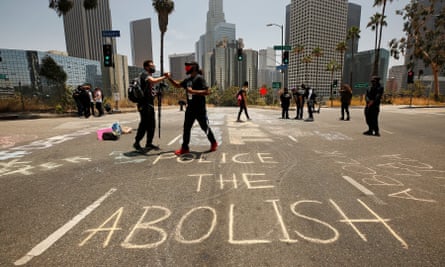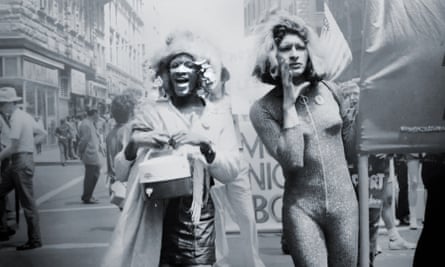‘We can enact the future we want now’: a black feminist history of abolition | Books
[ad_1]
At an event held in honour of Malcolm X in 1982, Audre Lorde delivered an address titled Learning from the 60s, during which she proclaimed, “Revolution is not a one-time event.” By this, Lorde meant that revolution belongs to everyone and no one simultaneously; if it is to proceed, it must cease to be the “sole and particular province of anyone particular race, or sex, or age, or religion, or sexuality, or class.” Revolutions reoccur: they follow each other, making circles of time and all the political demands that push them forward.Lorde’s statement makes clear the purview of the black feminist tradition; nothing must be allowed to remain. We must be prepared for the multi-purpose, multi-layered revolution, in which political ideologies and mantras will, and must, collide.
The word abolition, most commonly understood to describe efforts that sought a legal end to chattel slavery, has a complex history. Many white advocates who deployed the term in the height of the abolitionist movements of the 18th and 19th century were not actually interested in the material emancipation of black life. Aphra Behn’s 1688 novel Oroonoko, for example, intended to awaken the English middle-class to the horrors of slavery, while employing a number of deeply racist and dehumanising tropes to do so.
But abolition as we know it now, developed through the black feminist tradition, owes everything to imaginative potential. It is a belief in emancipatory forms of social organisation and an end to all forms of violence, expropriation and exploitation. As prison abolitionist Ruth Wilson Gilmore writes, abolition is about “presence, not absence”; prison abolition, as one example, is about “abolishing the conditions under which prison became the solution to problems.” Prison abolitionists argue that carceral systems like prison, policing and detention are dangerous and wholly inadequate responses to crime that merely perpetuate the harm they claim to end. They are critical of ways of thinking that root wrongdoing in the individual, arguing instead that the social causes of crime require social solutions, beginning with an improvement of the conditions of life for all – free education, housing provision, healthcare and investing in community self-governance. Abolitionists believe that racist systems of police and prison do not keep us safe and that they should not simply be reformed in an attempt to “improve” them, but abolished altogether.

The desire to abolish police and prisons can be traced in grassroots black feminist traditions across the world. In the 1970s and 80s in the UK, organisations such as the Organisation of Women of African and Asian Descent (OWAAD) and the Brixton Black Women’s Group, home to coalitions between black women and women of colour, campaigned against flagrant police violence and abuses of stop and search powers. Nicknamed “SUS laws”, these clauses enabled police officers to justify arrest solely on the basis of suspected intent to commit a crime. It is near impossible to ignore the legacy of such a law in the disproportionate searching, brutality and imprisonment of black people in the UK. In Heart of the Race, Black Women’s Lives in Britain, authors Beverly Bryan, Stella Dadzie and Suzanne Scafe write: “Even when our children were at school, we could expect the police to be called into the playground to break up fights… it was as a result of these experiences of racist police force that black women began to organise against specific incidents of abuse and against legislation.”
Kinship and community is how we keep each other safe when the state and racist institutions fail us
The actions of these feminist groups were prototypes for networks of mutual aid, like those that have emerged since the onset of the pandemic; they modelled what community power that sought to render the police irrelevant could look like. These women knew, as Stuart Hall writes, that “race is the modality through which class is lived” and their experiences as members of the working class were constituted and compounded by the systemic racism that locked them out of state protection and limited their access to resources.
The killing of George Floyd at the hands of Minneapolis police propelled abolition into the mainstream. Those of us who remember the eruption of protests, demonstrations, and organising around Black Lives Matter that took place in the UK in 2015, and who know the names of Joy Gardener, Cynthia Jarrett, Rashan Charles, Christopher Alder and so many more victims of racist police violence, feel the need to challenge the reductive view that this is only a US problem. So
Revolution is not a one-time event, a programme convened by Che Gossett, Sarah Shin and myself in collaboration with Arika and hosted by Silver Press, will attempt to understand and amplify abolitionist demands in this moment by bringing artists, organisers and academics together, and provide a space for reflection and political animus.
Our event The Master’s Tools Can Never Dismantle the Master’s House: Abolitionist Feminist Futures, to be chaired by academic and organiser Akwugo Emejulu and featuring academic Gail Lewis, critic Hortense Spillers, writer Zoe Samudzi and trans activist Miss Major, will explore abolitionist futures. In her work analysing black women’s presence and absence in public discourse, Lewis calls to Sarah Reed, a black woman with complex mental health issues who died in Holloway Prison in 2015 after being failed by mental health professionals and prison staff. “But if she is present, how is she here? / Only as: ‘brutalised black woman’… / Only as: a ‘mentally unwell black woman’?” Understanding Lorde’s idea that the “master’s tools will never dismantle the master’s house” means recognising that the system that locked Reed away will never set others like her free. This is the first step in dismantling ideas that a broken system can be “fixed” via law, police and prison reform.
“The intimate realm is an extension of the social world… so to create other networks of love and affiliation is to be involved in the work of challenging and remaking the terms of sociality” writes Saidiya Hartman, a participant of the second panel, Poetry is not a Luxury: The Poetics of Abolition. In 1985, Lorde wrote, “Poetry coins the language to express and charter this revolutionary awareness and demand, the implementation of that freedom.” If poetics is the study of the creation, production and art of making meaning, then we must understand its role in revolution. Hartman’s work directs the reader’s eye to the anarchic posture of black life and community, to the power of revolution lived at the register of the everyday. Her fellow panelist Christina Sharpe continues this tradition in her book In The Wake, in which she refuses to treat images as static archival memorabilia. She analyses black persistence and survival in the face of the processes that render black people outside subjects.

What does abolition mean in the age of the internet? Using coding, hacking and other means of online sabotage to make it harder for the police to target vulnerable people. “Glitch is a necessary erratum, a site of positive departure,” writes Legacy Russell, author of Glitch Feminism and chair of the panel System Errors: Abolitionist Technologies and Aesthetics. Through cyberfeminism, we can make ourselves unknowable in order to outsmart the logics of surveillance capital. Currently, law enforcement is using all manner of digital practice including photography and Instagram posts to track down and charge protesters. Technology must be harnessed to both liberate and obscure blackness; to strip the digital image of its power. British artist and panellist Danielle Brathwaite-Shirley does this in their work, building a video game-like space online that visitors must navigate to evade the threats that black trans people face everyday. This panel will explore how the current matrix of violent governance takes place through physical and digital forms of dispossession and must be fought on both grounds.
The last panel in this programme, Happy Birthday, Marsha! – held on the birthday of black trans campaigner Marsha P Johnson – centres on care. Abolitionist modes of thinking encourage us to discover new forms of intimacy, speculation and kinship by encouraging community building with those outside our immediate family. That is how we keep each other safe when the state and racist institutions fail us. Despite its complexity, at its most basic, abolition is about enacting the future we want now and refusing to let anyone tell us it is impossible.